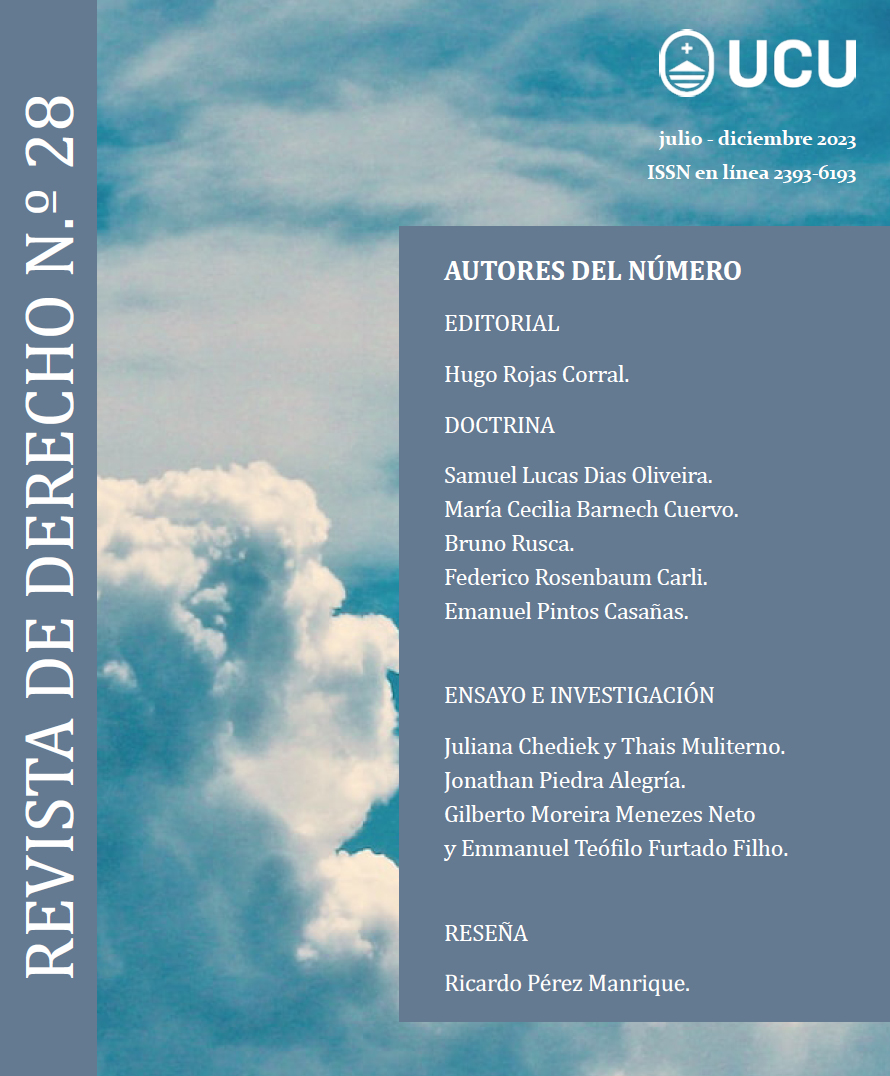Initial Notes for an Ethical Reflection on the Regulation on Artificial Intelligence in the European Union
DOI:
https://doi.org/10.22235/rd28.3264Keywords:
ethics, regulation, self-regulation, artificial intelligence, human rightsAbstract
This article discusses the European Union's (EU) efforts to establish a governance framework for artificial intelligence (AI) and highlights that, while regulatory proposals are a crucial step, there are significant areas for improvement concerning ethical matters. It argues that a human rights-based approach (HRBA) should be the regulatory and protective framework for all individuals in relation to AI, emphasizing that clear and concise regulation based on human rights cannot be replaced by "light" ethical visions. It underscores the importance of a proactive regulatory approach by states to create spaces for ethical reflection and impact where various voices are involved while questioning the idea of leaving AI regulation in the hands of companies and corporations. Finally, it underscores the need for a more robust regulatory approach, based on human rights, to address the ethical-legal dilemmas associated with AI.
Downloads
References
Agencia Latinoamericana de Información. (2019). Inteligencia artificial: DDHH, justicia social y desarrollo. Asociación para el Progreso de las Comunicaciones.
Aguilar Cavallo, G. (2010). Derechos fundamentales-derechos humanos. ¿Una distinción válida en el siglo XXI? Boletín Mexicano De Derecho Comparado, 1(127), 15-71. https://doi.org/10.22201/iij.24484873e.2010.127.4594
Alfieri, C., Caroccia, F., & Inverardi, P. (2022). AI Act and Individual Rights: A Juridical and Technical Perspective. https://ceur-ws.org/Vol-3221/IAIL_paper4.pdf
Allhutter, D; Cech, F; Fischer, F; Grill, G; and Mager, A. (2020). Algorithmic Profiling of Job Seekers in Austria: How Austerity Politics Are Made Effective. Frontiers in Big Data, 3. https://www.frontiersin.org/articles/10.3389/fdata.2020.00005
Batista Torres, J. (2018). Derechos humanos y Derechos fundamentales. Algunos comentarios doctrinales. IusLabor. Revista d’anàlisi de Dret del Treball, (2), 186-213. https://doi.org/10.31009/IUSLabor.2018.i02.05
Blackman, R. (2020, 15 de octubre). A Practical Guide to Building Ethical AI. Harvard Business Review. https://hbr.org/2020/10/a-practical-guide-to-building-ethical-ai
Bradley, C., Wingfield, R., Metzger, M. (2021). National Artificial Intelligence Strategies and Human Rights: A Review (2a ed.). Global Partners Digital & Stanford University. https://www.gp-digital.org/wp-content/uploads/2021/05/NAS-and-human-rights_2nd_ed.pdf
Coeckelbergh, M. (2021). Ética de la Inteligencia Artificial (L. Álvarez Canga, Trad.). Catedra Teorema.
Comisión Europea. (2018). Inteligencia artificial para Europa (COM(2018) 237 final). EUR-Lex. https://acortar.link/9XAvZe
Comisión Europea. Dirección General de Redes de Comunicación, Contenido y Tecnologías. (2019). Directrices éticas para una IA fiable. Oficina de Publicaciones. https://data.europa.eu/doi/10.2759/14078
Comisión Nacional de los Derechos Humanos. (s. f.). ¿Qué son los derechos humanos? https://acortar.link/Lm1uq
Committee on the Internal Market & Consumer Protection Committee on Civil Liberties, Justice and Home Affairs. (2023, 9 de mayo). DRAFT Compromise Amendments. Proposal for a regulation of the European Parliament and of the Council on harmonised rules on Artificial Intelligence (Artificial Intelligence Act) and amending certain Union Legislative Acts (COM(2021)0206 – C9 0146/2021 – 2021/0106(COD)). https://acortar.link/qZjKI1
Craig, P., & De Búrca, G. (2015). EU Law: Text, Cases, and Materials (6a ed.). Oxford University Press.
De la Quadra Salcedo, T., & Piñar Mañas, J. L. (Dirs.). (2018). Sociedad digital y derecho (1ª ed.). Boletín Oficial del Estado Ministerio de Industria, Comercio y Turismo & RED.ES.
De Luis García, E. (2018). El medio ambiente sano: La consolidación de un derecho. Iuris Tantum Revista Boliviana de Derecho, (25), 550-569. http://www.scielo.org.bo/scielo.php?script=sci_arttext&pid=S2070-81572018000100019
Elgammal, A., Liu, B., Elhoseiny, M., & Mazzone, M. (2017). CAN: Creative Adversarial Networks, Generating “Art” by Learning About Styles and Deviating from Style Norms. https://doi.org/10.48550/arXiv.1706.07068 .
European Commission. (2021, 21 de abril). Proposal for a regulation of the European Parliament and of the Council laying down harmonised rules on Artificial Intelligence (artificial intelligence act) and amending certain union legislative acts. EUR-Lex. https://eur-lex.europa.eu/legal-content/EN/TXT/?uri=celex%3A52021PC0206
European Commission. (2022, 28 de setiembre). Proposal for a directive of the European Parliament and of the Council on adapting non-contractual Civil Liability rules to Artificial Intelligence (AI Liability Directive). EUR-Lex. https://eur-lex.europa.eu/legal-content/EN/TXT/?uri=CELEX%3A52022PC0496
Franceschetti, D. (2018). Principles of robotics & artificial intelligence. H. W. Wilson Publishing.
Future of Life Institute. (2017, 11 de agosto). AI Principles: The Asilomar AI Principles, coordinated by FLI and developed at the Beneficial AI 2017 conference, are one of the earliest and most influential sets of AI governance principles. https://futureoflife.org/ai-principles/
GoodFellow, I., Pouget-Abadie, J., Mirza, M., Xu, B., Warde-Farley, D., Ozair, S., Courville, A., & Bengio, Y. (2014). Generative Adversarial Nets. En Advances in neural information processing systems (2672-2680).
Google. (2018, 7 de junio). AI at Google: our principles. https://blog.google/technology/ai/ai-principles/
Google. (2019). Perspectives on issues in AI governance. https://ai.google/static/documents/perspectives-on-issues-in-ai-governance.pdf
Graber, C. B. (2018). Artificial Intelligence, Affordances and Fundamental Rights. i-call Working Paper, (2). https://www.researchgate.net/publication/330423326
Hagendorff, T. (2020). The Ethics of AI Ethics: An Evaluation of Guidelines. Minds and Machines. https://link.springer.com/article/10.1007/s11023-020-09517-8
Hao, K (2020, 4 de diciembre). We read the paper that forced Timnit Gebru out of Google. Here’s what it says. MIT Technology Review. https://acortar.link/3qkzpA
Harari, Y. N. (2016). Homo Deus. Harvill Secker.
Kaplan, J. (2016). Abstenerse humanos. Guía para la riqueza y el trabajo en la era de la inteligencia artificial. Teell.
Kurzweil, R. (2012). La singularidad está cerca. Cuando los humanos trascendamos la biología. Lola Books.
Lee, K. F. (2020). Superpotencias de la inteligencia artificial. Planeta.
Lilkov, D. (2021). Regulating artificial intelligence in the EU: A risky game. European View, 20(2), 166-174. https://doi.org/10.1177/17816858211059248
Lopez, P. (2020). Reinforcing Intersectional Inequality via the AMS Algorithm in Austria. Proceedings of the STS Conference Graz 2019 (289-309). https://diglib.tugraz.at/download.php?id=5e29a88e0e34f&location=browse;epicenter.works
Mccarthy, J. (2018). What is AI? Basic Questions. http://jmc.stanford.edu/artificial-intelligence/what-is-ai/index.html
Media, E. (2020, 13 de enero). Ser complacientes con la realidad no tiene nada que ver con la felicidad. Ethic. https://ethic.es/entrevistas/victoria-camps-felicidad-eduardo-madina/
Mondal, B. (2020). Artificial Intelligence: State of the Art. En V. E. Balas, R. Kumar & R. Srivastava (eds.), Recent Trends and Advances in Artificial Intelligence and Internet of Things (pp. 389-425). Springer International Publishing.
Oficina del Alto Comisionado de las Naciones Unidas para los Derechos Humanos. (2022, 8 de enero). La Oficina. https://acnudh.org/la-oficina/
Organización para la Cooperación y el Desarrollo Económico. (2019, 21 de mayo). Recommendation of the Council on Artificial Intelligence. https://legalinstruments.oecd.org/en/instruments/OECD-LEGAL-0449
Parlamento Europeo. (2016, 27 de abril). REGULATION (EU) 2016/679 OF THE EUROPEAN PARLIAMENT AND OF THE COUNCIL of 27 April 2016 on the protection of natural persons with regard to the processing of personal data and on the free movement of such data, and repealing Directive 95/46/EC (General Data Protection Regulation). EUR-lex. https://acortar.link/bzp1Xf
Parlamento Europeo. (2017, 16 de febrero). Resolución del Parlamento Europeo, de 16 de febrero de 2017, con recomendaciones destinadas a la Comisión sobre normas de Derecho civil sobre robótica (2015/2103(INL). EUR-Lex. https://eur-lex.europa.eu/legal-content/ES/ALL/?uri=CELEX%3A52017IP0051
Parlamento Europeo. (2023, 14 de junio). Ley de Inteligencia Artificial. https://www.europarl.europa.eu/doceo/document/TA-9-2023-0236_ES.html
Piedra Alegría, J. (2021). La smartificación de la administración pública: apostillas críticas a partir del caso europeo. Cuadernos Salmantinos de Filosofía, 48, 235-250. https://doi.org/10.36576/summa.144500
Piedra Alegría, J. (2022a). Venditio fumi: Autorregulación Empresarial e Inteligencia Artificial. Sincronía, XXVI(81), 232-249. https://doi.org/10.32870/sincronia.axxvi.n81.12a22
Piedra Alegría, J. (2022b). Decolonizando la «Ética de la Inteligencia Artificial». Dilemata, (38), 247–258. https://www.dilemata.net/revista/index.php/dilemata/article/view/412000447
Raso, F., Hilligoss, H., Krishnamurthy, V., Bavitz, C., & Levin, K. (2018). Artificial Intelligence & Human Rights: Opportunities & Risks. Berkman Klein Center Research Publication, (6). https://papers.ssrn.com/sol3/papers.cfm?abstract_id=3259344
Risse, M. (2018). Human Rights and Artificial Intelligence: An Urgently Needed Agenda. HKS Faculty Research Working Paper Series RWP18-015. https://acortar.link/kHrtZx
Robles Carrillo, M. (2020). Artificial intelligence: From ethics to law. Telecommunications Policy. https://doi.org/10.1016/j.telpol.2020.101937
Tagesspiegel Background. (2023). Ethik-Waschmaschinen made in Europe. https://background.tagesspiegel.de/ethik-waschmaschinen-made-in-europe
Tegmar, M. (2018). Vida 3.0. Qué significa ser humano en la era de la inteligencia artificial (Trad. Marcos Pérez Sánchez). Penguin Random House.
Unión Europea. (2010, 30 de marzo). Tratado de la Unión Europea y Tratado de Funcionamiento de la Unión Europea. Versiones consolidadas. Protocolos. Anexos. Declaraciones anejas al Acta Final de la Conferencia intergubernamental que ha adoptado el Tratado de Lisboa. Diario Oficial de la Unión Europea, (83). https://www.boe.es/buscar/doc.php?id=DOUE-Z-2010-70002
Velarde, G. (2021) Era Artificial: Predicciones para ultrahumanos, robots y otros entes inteligentes. Prica.
Wagner, B. (2018). Ethics As An Escape From Regulation. Being Profiled: Cogitas Ergo Sum: 10 Years of Profiling the European Citizen (84-89). Amsterdam University Press. https://doi.org/10.2307/j.ctvhrd092.18
Published
How to Cite
Issue
Section
License
Copyright (c) 2023 Revista de Derecho

This work is licensed under a Creative Commons Attribution 4.0 International License.













